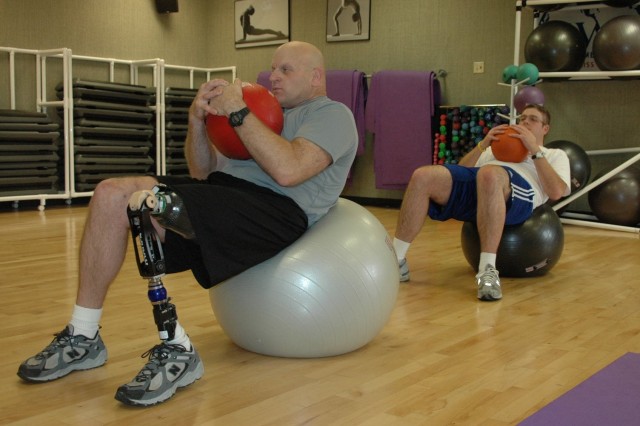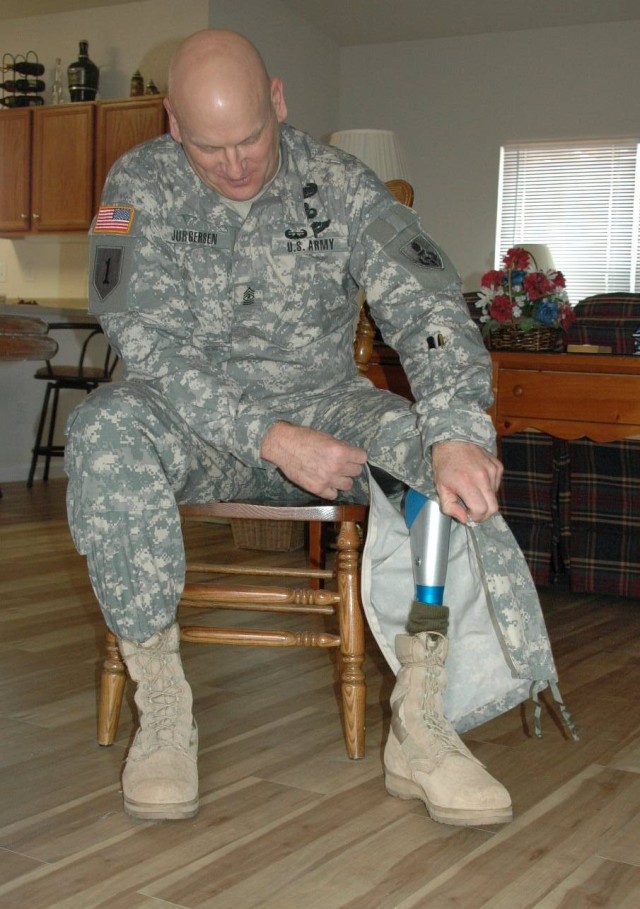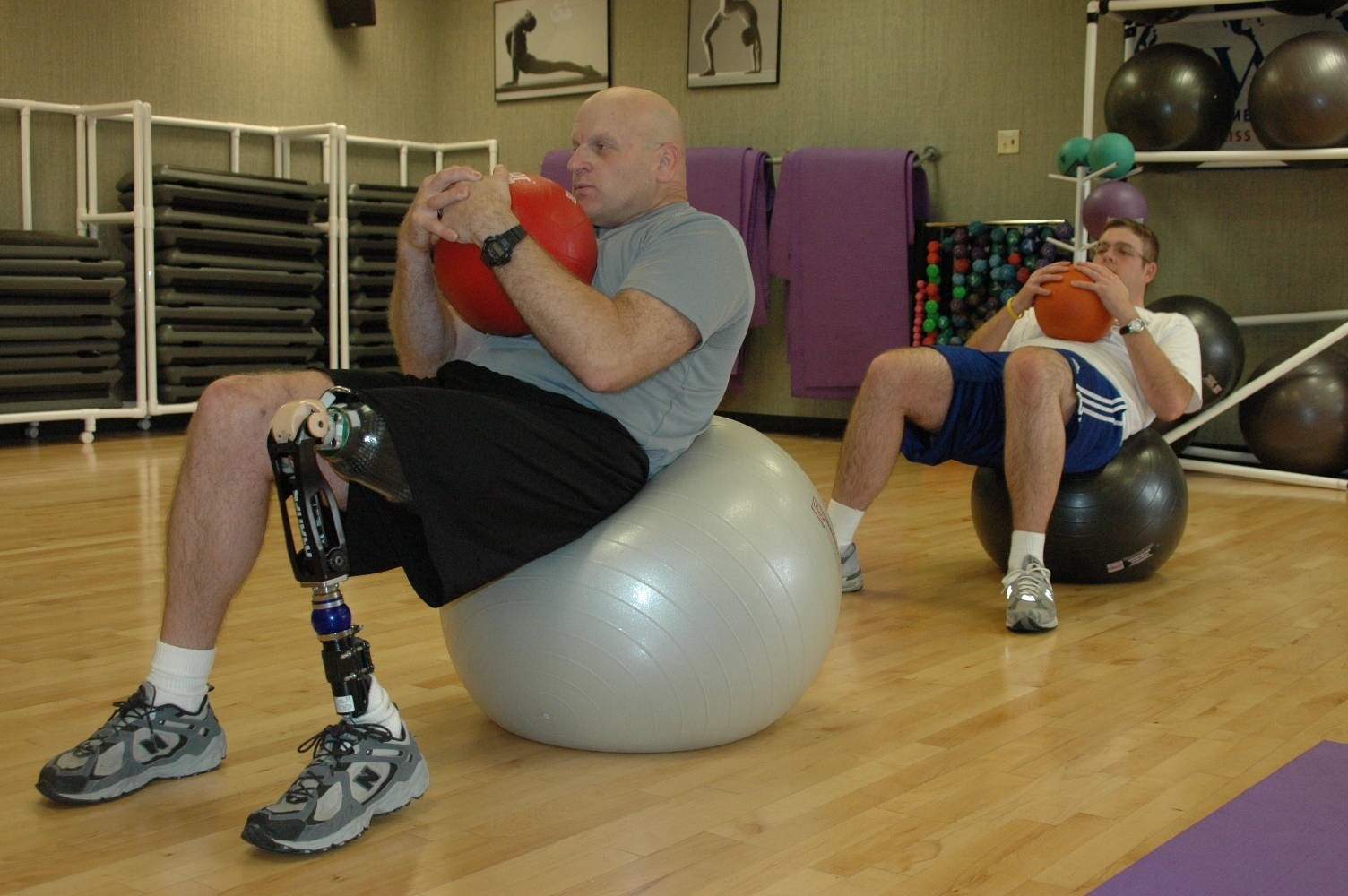FORT BLISS, Texas (Army News Service, Jan. 7, 2007) - Loyalty and allegiance by definition means faithfulness to whatever one is tied to, by duty, pledge or promise. It's a person's willingness to devote their moral and intellectual resources bigheartedly and enthusiastically, which describes Sgt. Maj. Brent Jurgersen, the first full limb amputee student to attend the Army Sergeants Major Academy.
Not even two near-death encounters deterred his passion and eagerness to serve his country and lead his troops back home.
Jurgersen celebrated his second "alive day" anniversary Jan. 26. It was a day of mixed emotions for him because on that same day two years ago he was given a second chance to live. It was a day that changed his life forever. While on patrol in Ad Dyuliah, Iraq, two rocket-propelled grenades struck his Humvee. The explosion killed his gunner and left Jurgersen fighting for his life, flat-lining twice on the operating table in Balad.
He's glad to be alive, loves being part of the Army family and especially likes interacting and getting together with his family, friends, peers and the wealth of people from diverse backgrounds whom he has met at the academy.
During Operation Iraqi Freedom II, Jurgersen was the first sergeant for Headquarters and Headquarters Troop, 1st Squadron, 4th U.S. Cavalry, 1st Infantry Division, based at Samarra East Airfield, Iraq. He also served as the noncommissioned officer in charge of Forward Operating Base MacKenzie, Iraq supporting more than 1,600 Soldiers, Airmen and civilians.
While conducting combat operations June 18, 2004, Jurgersen encountered his first life threatening injury. He was shot in the face, which resulted in a severely ripped lip, shredded tongue, missing teeth and an arterial wound to his throat.
He was in a coma and on life support to help him breathe.
Doctors at Landstuhl Regional Medical Center, Germany, expected Jurgersen to be in a drug-induced coma for at least three months. However, three weeks later he was out of the hospital and four months later, the "Rock," a nickname he earned years ago, was healed and ready for battle. Despite friends' advice to stay behind, Jurgersen returned to Iraq, determined to complete the mission, and bring his troops home.
Jurgersen suffered the second near death encounter Jan. 26, 2005, the day he recognizes as his "alive day" anniversary. It was while conducting a reconnaissance patrol that his Humvee was hit by the RPGs. Jurgersen was critically injured, stabilized, and flown to Walter Reed Army Medical Center, in Washington, D.C.
"When I regained consciousness five days later, my wife, Karin explained my injuries," said Jurgersen. "I had an open compressed skull fracture with a brain hematoma, traumatic brain injury, injury to the left leg resulting in amputation through the knee, deep joint and soft tissue injury to the right knee, open fracture of the right hand and ring finger, and numerous other shrapnel wounds and burns to my body.
"Like many, I am still searching for why my life was spared and another's taken," he said. "When I woke up two years ago from a coma, I remember the look in my wife's eyes, and I remember looking down at my body in disbelief. I shook my head and had to look away. I honestly thought my life was over, as I knew it. I also thought my military career was over."
But, the Army took care of Jurgersen and his family. He was approved to remain on active duty.
"I now have to find the best way to serve our great country, the Army and Soldiers," he said.
During a promotion ceremony last August, Jurgersen was selected for a command sergeant major appointment - his dream had arrived.
The Army asked Jurgersen to become the Sergeant Major of the Army Wounded Warrior Program. Jurgersen said it was one of the hardest career decisions he ever made. He struggled with the idea of deferring his command sergeant major appointment for a year, but finally realized it was not about what Soldiers put on their uniform, but what is done for them and their families.
He accepted the appointment.
Having gone through numerous surgeries and countless hours of physical therapy, he has experienced first hand set backs, nightmares, survivor's guilt, phantom pain and the lengthy step-by-step requirements needed for approval to stay on active duty. Jurgersen said he'd like to see some modifications and implementations of policies for the many wounded Soldiers. He wants Wounded Warriors to know there are options even after being critically wounded.
"I'm just doing what I think is right. It will be an honor to represent the thousands of wounded Soldiers and their families, and lead the civilian and military personnel charged with caring for them," he said.
(Virginia Reza serves with the Fort Bliss public affairs office.)




Social Sharing